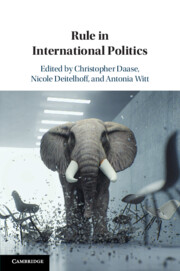Exploring Relations of Rule and Resistance in Global Politics
This chapter introduces a conception of rule that takes resistance rather than obedience as the constitutive element of rule. Based on an eclectic reading of different theories of rule, we argue that there is no rule without resistance. Even though rule might aim at suppressing resistance or might take such a subtle shape that it hardly encounters resistance, conceptually, rule is bound to resistance. Without a minimum of opposition, a recourse to rule would not be necessary. Even legitimate rule, which Weber calls authority, is legitimate only to a certain degree. As a consequence, not only obedience and the will to comply, but also dissent and the will to resist are part of rule. This chapter therefore sheds light on the relational dimension of rule, by analyzing the dynamic relationship between (forms of) rule and (forms of) resistance at the global level. To this end, we distinguish between two forms of resistance – opposition and dissidence – in order to show how resistance and rule implicate and influence each other. To demonstrate this relationship, we discuss four illustrative case studies on state and non-state forms of resistance and how they indicate and influence different forms of rule.


